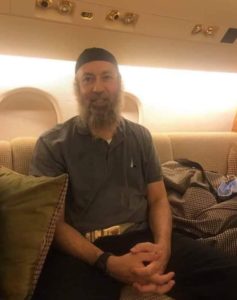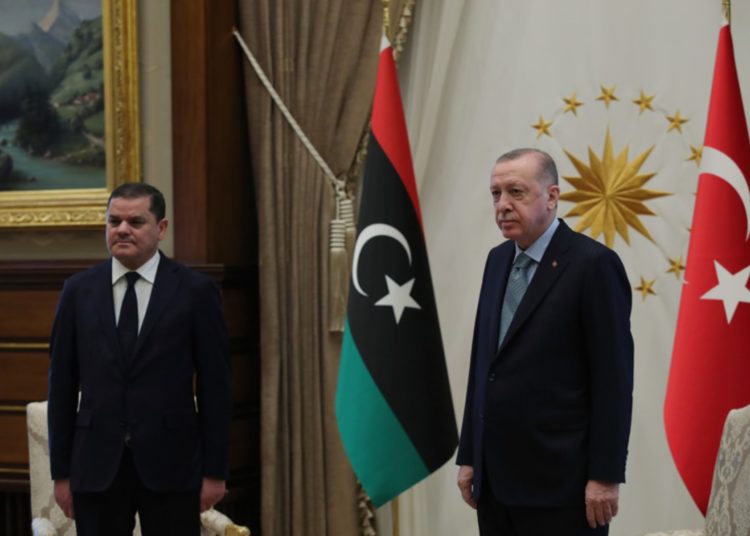Abdullah Bozkurt/Stockholm
The Turkish government declined to respond to repeated queries by the UN investigators who determined that Saadi Qadhafi, sanctioned by the UN Security Council and wanted by INTERPOL, went to Turkey on a special flight after his release from a Libyan jail.
In a report submitted to the UN Security Council on May 27, 2022 the Panel of Experts on Libya stated that Turkey declined to respond to their inquiries concerning the whereabouts of Qadhafi, even though the evidence indicated that he was offered safe haven by the government of President Recep Tayyip Erdoğan.
Qadhafi, the younger son of former leader Muammar Gaddafi, who was deposed and killed during a 2011 uprising, had been in a Tripoli jail since 2014 after he was extradited from Niger, where he fled in 2011. He was accused of committing crimes against protestors during the uprising and placed on the sanctions list of the UN Security Council, which in March 2011 had called on member states to implement both a travel ban and an asset freeze for him. He was also placed on an INTERPOL watch list.
Although he is still under sanctions, his travel to Turkey means the Erdoğan government willfully and deliberately violated UN Libya resolutions. His sanctuary in Turkey was reportedly part of a deal negotiated by Turkish government officials with Libyan authorities including Prime Minister Abdul Hamid Dbeibeh and former Interior Minister Fathi Bashagha.
Turkey’s policy of denial was first displayed when a Dassault Falcon 900EX, owned by the Libyan government under registration no. 5A-DCN, landed in Istanbul at 1:37 a.m. on September 6, 2021. Although a local wire service dispatched a short story on the arrival with a photo of the plane, a few hours later Turkish officials were quoted as saying they could not confirm the news.

In an interview with a Turkish news outlet three days after Qadhafi’s arrival in Turkey, Moussa Ibrahim, the former spokesman of Muammar Gaddafi, who is also close to the family, said the Turkish Foreign Ministry coordinated all the travel plans and that he is free and safe in Turkey. He claimed Egypt and Saudi Arabia were also possible destinations but that Qadhafi opted for Turkey.
When asked by the UN experts, the Libyan government formally confirmed the plane flew to Turkey and that Qadhafi was on board. Two letters sent to Turkey by UN investigators in September and November 2021, seeking additional information, remain unanswered as of today.
There has been speculation as to why Erdoğan decided to bring Qadhafi to Turkey when he was arming and supporting factions, especially Islamists, against Libya’s eastern-based commander Khalifa Haftar, who is aligned with most former Qadhafi supporters. Suggestions range from Turkey’s attempt to undermine the Haftar bloc by wooing members of the Qadhafi family and their supporters to gain political capital for future spending in the event the Qadhafi family makes a comeback one day despite all odds.
UN Security Council report put a spotlight on Turkey vis-à-vis the whereabouts of Saadi Qadhafi:
All of the speculation about the motives of the Turkish government sounds plausible. But no one has so far entertained the idea that President Erdoğan may have had a personal financial stake in the wealth and assets the Qadhafi family had stashed abroad, especially in Turkey. The fate of Muammar Gaddafi’s $400 million that went missing from Arap-Türk Bankası (A&T Bank) after it was seized by government regulators in July 2011 is still an unsolved mystery.
The Libyan Foreign Bank, owned by the Libyan Central Bank, has a 62.37 percent majority share in A&T Bank, followed by Turkish private lender İş Bankası and Turkey’s state bank Ziraat Bankası. The Erdoğan government continued to operate the bank after the seizure and reportedly used some 2 billion Turkish lira from the bank’s coffers to support factions in Libya.
A&T Bank was on the radar of Turkish investigators in 2013 when they were probing an organized crime syndicate that incriminated Erdoğan family members including his younger son Bilal Erdoğan and his son-in-law Berat Albayrak. The graft probe, made public on December 25, 2013, revealed that Erdoğan set up what was called a “pool media,” which refers to a pool of funds contributed by pro-government businessmen in return for favors in the form of public tenders.
INTERPOL notice about Saadi Qadhafi:
Erdoğan wanted to create his own media by purchasing the Sabah-ATV media outlet and ordered his minister Binali Yıldırım to collect $630 million from businesspeople close to him in exchange for granting major public tenders in no-competition bidding. Some of the money in this kickback scheme would be obtained from A&T Bank as well as its shareholder Ziraat, both of which were under the control of the government at the time.
The bank was also in play in an Iran sanctions busting scheme and exposed when a damning revelation was made in a corruption case involving Turkish Iranian national Reza Zarrab, who bribed senior government officials including cabinet ministers and cultivated personal ties with Erdoğan. The case, which went public on December 13, 2013, showed that Zarrab secretly communicated with Özgür Erker, an A&T Bank official to discuss a money laundering scheme on behalf of Iran.
A wiretap obtained on October 5, 2012 revealed that Zarrab talked to Erker about a new scheme to launder Iranian money that would first arrive at state lender Halkbank, then move to A&T Bank. Using his position at the bank, Erker would later disburse the cash to Zarrab. Both men agreed on the scheme. When Zarrab asked Erker if others in bank management could create problems for them, Erker said, “There won’t be a problem.”
Wiretap of a conversation between Reza Zarrab and Özgür Erker, an A&T Bank official:
Erdoğan, who was incriminated in that probe, stepped in to derail the prosecution and helped release all the suspects after he orchestrated the removal of the lead prosecutors and investigators in the case. All suspects including Zarrab were later acquitted by new judges who were brought in to oversee the case by the Erdoğan government.
However, Zarrab was arrested by the FBI in Miami in 2016 and charged by the US Attorney for the Southern District of New York with engaging in hundreds of millions of dollars’ worth of transactions on behalf of the Iranian government, money laundering and bank fraud. He made a plea deal with prosecutors and cooperated in a US federal case that exposed the role of Erdoğan, who had instructed Turkish state banks to participate in the multi-billion dollar scheme in exchange for kickbacks.
At the end of the trial, Mehmet Hakan Atilla, the deputy general manager of state lender Halkbank, was convicted and served time before returning to Turkey. The co-conspirators who were indicted by the US federal prosecutors including former economy minister in the Erdoğan cabinet remain beyond reach.
Therefore, it is fair to make an assumption that money plays a crucial role in the calculations of President Erdoğan when it comes to the Libya file. It would not be surprising to see that Qadhafi’s sanctuary in Turkey has much to do with money in addition to politics and leverage sought by the Erdoğan government in North Africa.
Let’s recall that in the early years of the Syrian conflict, Turkish intelligence agency MIT not only transported arms and fighters from Libya to Syria to topple the Bashar al-Assad regime but also moved Libyan cash in planes it operated. At the time Erdoğan was even accused of conspiring with Aisha Gadhafi, the daughter of the late Libyan leader, in stashing some of the family’s funds in Turkey. Now the same MIT is providing security for Saadi Qadhafi and his family during their stay in Turkey.












